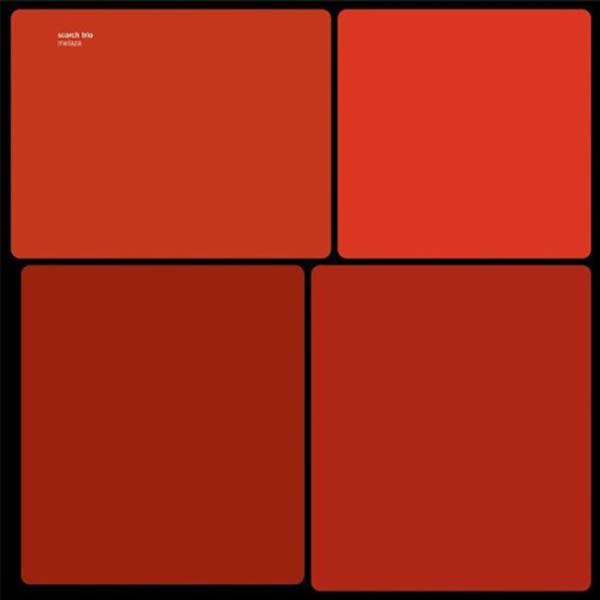
by Tim Owen
February 07, 2011
/ ALBUM
"Melaza" is the product of a Scorch Trio that perhaps hasn't yet nailed the same intensity as its earlier incarnation, but it's still a powerful statement.
Scorch Trio
Melaza
(Rune Grammofon)
With three albums already since 2002 (“Scorch Trio”; “Luggumt” 2004; “Brolt!” 2008), all of which teamed the Finnish guitarist Raoul Bjorkenheim with the established Norwegian rhythm duo of Ingebrigt Haker Flaten and Paal Nilssen-Love, the Scorch trio had taken on an air of permanence. So it came as something of a surprise to learn that Paal Nilssen-Love had been replaced by Frank Rosaly, a Chicagoan with a limited profile abroad.
In the old Scorch, the close rapport between Haker Flaten and Paal Nilssen-Love led to some intense, intricately knotty free jazz, as typified by Brolt!‘s opening salvo “Olstra”. It’s easy to imagine that such meaty fare might be as off-putting to some of Bjorkenheim’s potential listenership as it is absorbing for his fans. “Melaza”, on the other hand, with its more open textures and more readily comprehensible riffs and grooves, should have greater cross-genre appeal. The opening track, “Relajo”, sees Haker Flaten and Rosaly grooving on parallel lines, with Rosaly doing a masterful job of accumulating and distributing tension. Where the backing to “Ostra” was a thorny improv tussle there’s lots of clear sonic air here between drums and bass.
The presence of Rosaly aside, another key difference between “Melaza” and the earlier releases is in its production style. All four albums were recorded practically live in the studio with few overdubs, but where the others were recorded in Oslo studios “Melaza” was recorded in New Jersey with recording engineer Robert Musso. Musso is an understandable choice, a fellow guitarist who has enjoyed a long working relationship with Bjorkenheim’s sometime employer Bill Laswell. It was Musso, to pull just a couple of examples from my own shelves, who recorded both Massacre’s ?Funny Valentine’ (1998, featuring Fred Frith) and the Yoshihide/Laswell/Tatsuta one-off “Episome” (2006, featuring Yoshihide on electric guitar).
The main effect of Musso’s retooling of the Scorch machine has been to pare back the sonic thickets to reveal the groups technical virtuosity, which may have been just what the trio wanted. On this album Haker Flaten plays exclusively Fender bass; no double bass; no electronics, and clarity seems the order of the day. Musso has accordingly streamlined the Scorch sound, and in so doing inevitably lightened its impact. In the gentler material this pays off beautifully. Whereas the best of “Brolt!” comes in its moments of unapologetic, scorching power jazz (witness the one-two punch of “Hys” and “Gaba”), the highlights of “Melaza” are its more delicate, even refined elements, such as the pointillist guitar of “Orita”, and the lovely bowed-bass and skittish percussion of “Raitr?”. (I note, incidentally, that Rosaly has often played opposite electric cellist Fred Lomberg-Holm in the past, and that might give anyone familiar with Lomberg-Holm a hint as to the inclusive versatility of Rosaly’s approach.) The downside of this is that the more brawny tracks sound somewhat over-exposed. That which was previously thrilling about Bjorkenheim’s guitar virtuosity, as applied to free-jazz power-play, here comes across as just the sort of anachronistic rockist self-indulgence that some critics are all too ready to perceive. I think they’re wrong.
Perhaps a little history will shed some light on Bjorkenheim’s purpose. He got his first serious recognition in the context of Edward Vesala’s ensemble Sound and Fury, which blended rock, jazz, and classical music to wonderful and inimitable effect. In the late 1980s Bjorkenheim formed his own band, Krakatau, and pitched himself into an outer-jazz orbit alongside other such iconoclastic guitarists as James ?Blood’ Ulmer and Sonny Sharrock. In the late ?80s he played alongside Bill Laswell in Phantom City, an avant funk/jazz super-group led by sound and installation artist Paul Sch?tze. More recently Bjorkenheim has been a member of another super-group of sorts, Rune Grammofon’s Box. Bjorkenheim has also played pure improv dates with NYC veterans William Parker and Hamid Drake. All in all, as this progression might suggest, he’s no one-dimensional virtuoso onanist but a vividly distinctive stylist, with a refreshing lack of regard for the po-faced fickleness of the studiously right-on. His electric guitar playing expresses the controlled freedoms of improvised jazz while relinquishing none of the coruscating power dynamic of rock. “Melaza” is the product of a Scorch Trio that perhaps hasn’t yet nailed the same intensity as its earlier incarnation, but it’s still a powerful statement, and Scorch a powerful vehicle for a thrilling artist with few real peers in improvised music.
blog comments powered by Disqus